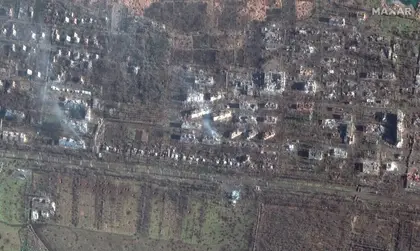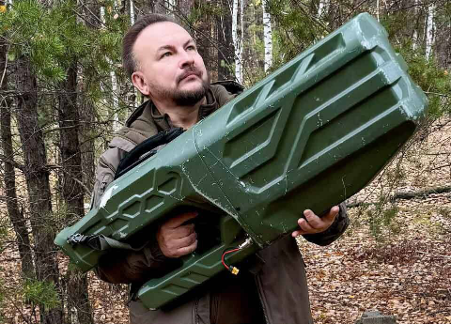Ukrainian troops are employing omnipresent drones, artillery ambushes and delaying tactics, prioritizing enemy kills over holding ground in a bid to stem the Kremlin’s massed infantry assaults in the eastern Donbas sector, Russian battle participants, eyewitnesses and military observers said.
In a write-up on Armed Forces of Ukraine (AFU) tactics published on his personal channel, Russian military observer Boris Rozhin said that in the battleground city of Bakhmut Ukrainian infantry was holding buildings to the last possible moment, and attempting to inflict maximum casualties, before retreating to the next block to repeat the process.
- Access the newest war in ukraine update in the Kyiv Post's daily news articles published today.
- Find the latest Ukraine news published as of today.
JOIN US ON TELEGRAM
Follow our coverage of the war on the @Kyivpost_official.
“The enemy here is acting as expected – containment and slow withdrawal with subsequent defenses (farther back) in the western part of the city,” Rozhin said on Feb. 4. An outspoken Kremlin supporter, Rozhin claimed that Ukrainian defenders around Bakhmut are fighting fiercely, but predicted Moscow’s troops will defeat them in house-to-house fighting.
Peculiarly enough, Colonel General Oleksandr Syrsky, AFU Ground Forces commander, in a Feb. 6 statement agreed with much not but all of Rozhin’s evaluation, saying that Bakhmut is a “fortress” and Ukrainian troops fully intend to hold defenses in the area for the long term. The Ukrainian strategy of inflicting maximum casualties on advancing Russian troops is working to horrific effect, Syrsky said, predicting that Bakhmut would hold and AFU troops in and around the city would win the defensive battle.

Putin Seeks to Shore Up Ties on Visit to ’Friendly’ Kazakhstan
The Institute for the Study of War (ISW) in a Feb. 5 situation estimate said heavy Russian pressure on Bakhmut may force limited Ukrainian retreats in that sector but are unlikely to result in a major breakthrough or a Ukrainian defeat, a view widely held by independent analysts. Official Ukrainian sources, for their part, are claiming General Syrsky’s “kill-’em-as-they-come” tactic is working well.
On Feb. 6 Ukraine’s Army General Staff (AGS) in its daily situation estimate reported Ukrainian troops killed 1,030 Russian soldiers in fighting in all sectors – the highest 24-hour kill claim for the entire war, apart from the very early stages when massive Russian armored and airborne attacks were eviscerated while assaulting Kyiv’s northern suburbs in March 2022. Kremlin-controlled media has reported little of the Russians’ allegedly heavy casualties, but hinted they are light.
By contrast, a chorus of unofficial Russian sources, mostly from the ground, report that Russian Federation (RF) troops attempting to capture the eastern cities of Maryinka, Avdiivka, Vuhledar and Kreminna have often been decimated by Ukrainian artillery concentrations – particularly when Russian infantry are ordered to advance over open ground without strong tank or artillery support.
In a long Feb. 3 Telegram post, an “LPR” bogger and combatant with the nom de guerre Murz told of catastrophic results he observed as poorly trained Russian reservists were sent into the teeth of Ukrainian firepower in the southern Luhansk region.
“They [attacking Russian soldiers] have no armor, no communication, no normal artillery support, and they die. They are ordered to go forward. And they die. Without significant results in their area… the only result of these absolutely monstrous losses, which has lowered the combat value of our infantry below the floor, is that the Ukrainians can’t… move troops for counterattacks… nobody learns anything, nobody wants to learn anything, I am so f*cking sick of it.”
Practically all RF-associated eyewitnesses of the Donbas fighting describe very dense AFU drone presence over Russian troops and positions. In his personal information feed, RIA Novosti journalist Aleksander Kharchenko on Feb. 3 told followers he had been “sitting in a damned village for days” with AFU drones buzzing constantly over Russian troops’ heads, and with any ground movement drawing quick Ukrainian mortar or artillery fire.
“There were six ‘birds” above the village. During the day they [the Ukrainians] used regular drones, and at night they used drones equipped with thermal sights,” Kharchenko wrote. “In a very short period of time they found the lines of defense and where our people were moving. Once the reconnaissance was done, the Ukrainians registered a few paths and intersections, and then they fired to crush any movement. Morale falls by an order of magnitude.”
Dramatic AFU airborne drone video published from the Vuhledar sector on Feb. 2 and reportedly recorded by an AFU artillery brigade in the vicinity, showed the crewmen of four late-model Russian T-90S tanks under artillery fire bailing out, while caught in a minefield. Official Ukrainian sources claimed the ambush left at least 30 Russian armored vehicles abandoned or destroyed and sent a major, two brigade-sized, Russian combined arms assault reeling.
Rozhin reported “Russian Marines” and tanks destroyed some Ukrainian vehicles. The Ukrainian group Ishchi Svoikh, an NGO working to inform Russian army families of casualties in Russian army forces in Ukraine, on Feb. 3 reported the assault failed catastrophically. In a video he identified ten men by name, who were taken prisoner, claiming they were members of a Naval Infantry Brigade based in Russia’s Far East.
Igor Girkin, a former intelligence officer wanted by Interpol for complicity in the 2014 MH17 shootdown and a longtime critic of Russian army commanders, in a Feb. 3 statement said Ukrainians are conducting a successful minimalist defense. Kyiv is accepting limited troop losses and, if pressed, ordering its soldiers to fall back in limited retreats in order to maximize Russian casualties.
Girkin said the long-term Ukrainian strategy is to use the first months of 2023 to gut the Russian army of soldiers, while preparing for a major future offensive built on a backbone of hundreds of US-made Bradley infantry fighting vehicles and German Leopard 2 tanks en route to Ukraine and set to be operational in late spring. The strategy is working, he said.
“The enemy [Ukraine] up to now has not used its major reserves and is soon expecting the delivery of new military equipment from NATO. In general, we aren’t seeing evidence of that [Western heavy weapons] even in limited sectors of the front where battles are taking place,” he said. “It’s worth noting that when our troops attack in various sectors – Avdiivka, Vuhledar, Maryinka – the enemy has even stopped conducting very limited, tactical withdrawals.”
You can also highlight the text and press Ctrl + Enter






